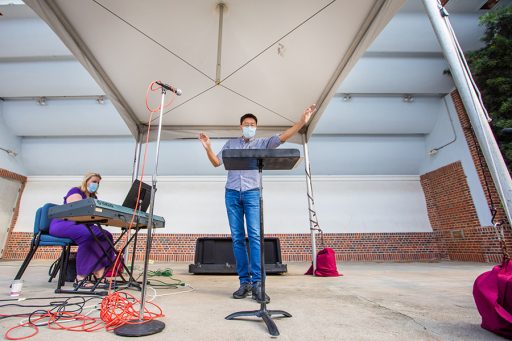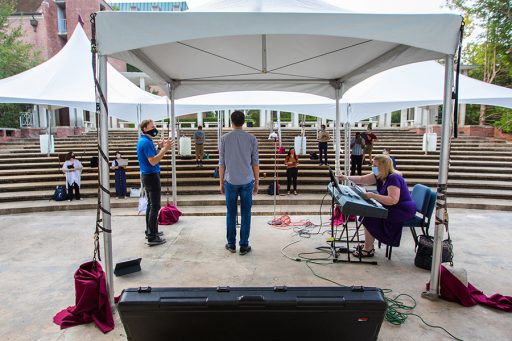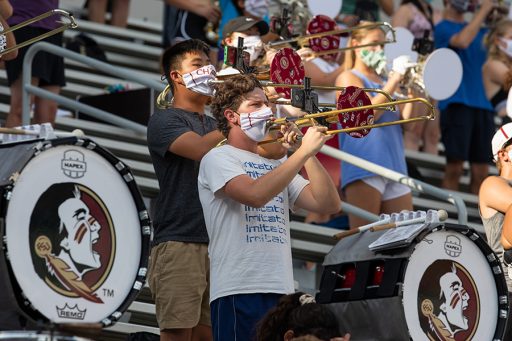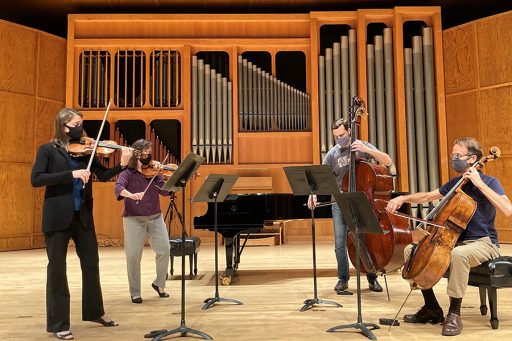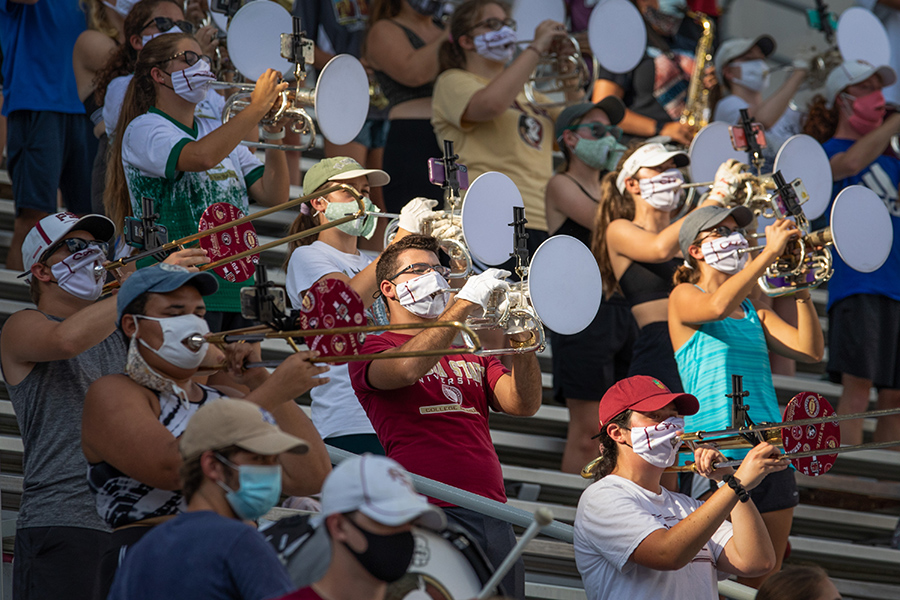
Music is in the air once again at Florida State University.
While the pandemic has upended “normal” campus life, students and faculty from the College of Music are using the unexpected course of events as a source of creativity and inspiration.
As students returned to campus this fall, FSU’s renowned music programs and their faculty were determined to provide the best educational experiences, while still following the CDC’s COVID-19 health and safety protocols.
“The college is singularly committed to carrying out our core mission of providing a comprehensive educational environment to help our students develop their full potential,” said Michael Thrasher, interim dean for the College of Music. “At the same time, we believe we have a professional obligation to promote a healthy and safe environment for students, faculty, staff, patrons and supporters. All of our efforts over the last several months have focused on these ideas.”
The college took a hard look at its classroom space, invested in new technology to help livestream events and ordered innovative face masks for wind and brass musicians that allowed them to safely perform while socially distanced.
“It is in such challenging moments that the amazing creativity in the College of Music shines its brightest,” said Gregory Jones, associate dean of the College of Music. “The ability of our students and faculty to be resilient and flexible has enabled the college to move forward during this time of uncertainty. We are so thankful that FSU’s buildings are again filled with music and lively discussion between our faculty and students.”
Working with FSU’s Master Craftsman Studio, the college incorporated new personal protective equipment (PPE) products, such as custom Plexiglas applications which have facilitated in-person music instruction without compromising the safety of students and faculty.
For individual music teaching studios, the Master Craftsman Studio designed seven-foot-tall free-standing barriers that allow a teacher with an instrument to demonstrate on one side of the barrier and a student with an instrument to perform on the other side.
To address the need for safe social distancing at larger venues, some ensemble rehearsals shifted to the Donald L. Tucker Civic Center, while others moved outdoors to the Owen Sellars Amphitheater, which was newly enhanced with the addition of several tents.
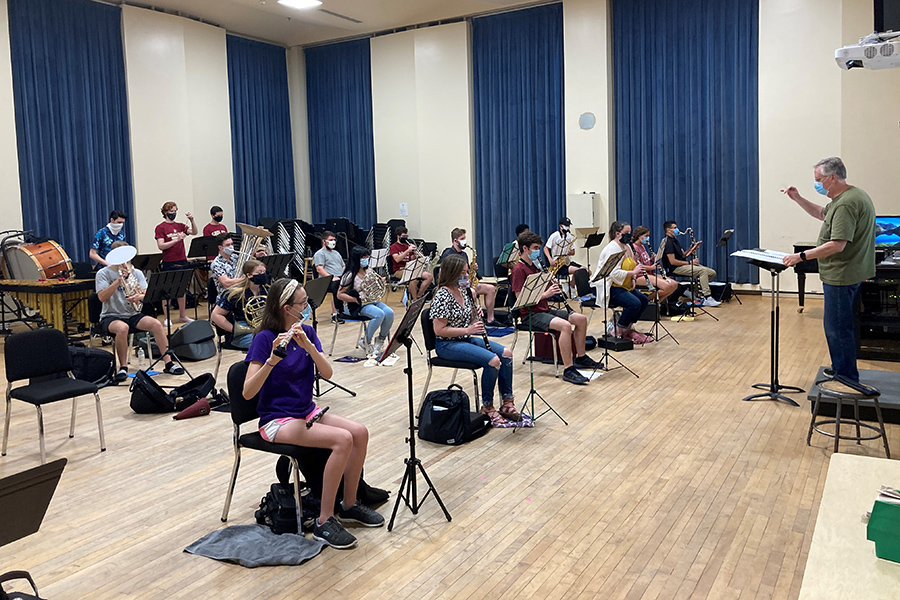
Larger classroom spaces in the Diffenbaugh Building were made available to the college to allow face-to-face teaching.
Students and faculty typically perform at more than 500 events per year. When plans for the fall semester initially materialized, university officials felt it was imperative that special guidelines for ensemble rehearsals and performances be addressed.
Planning for concerts without audiences revealed a need to develop enhanced video recording and livestream capabilities so performances could be shared with audiences.
“We had to change our approach and mindset from the way we were addressing our production workflow before COVID-19,” said Michael Shapiro, audio/video engineer in the College of Music. “Fortunately, we had great leadership within our team to meet these new demands. We are excited to embrace this new direction.”
Although concerts are currently closed to the general public, performances are now available virtually, giving access to music aficionados around the world.
During the late summer and early fall, audio recording staff and graduate assistants in the college formed production teams to increase livestream and video sharing of musical events. WFSU and its team provided vital hands-on training in this process. New programming by college staff will continue to take advantage of the WFSU website for both streaming and on-demand concert video access.
“These new capabilities are a great step forward as we now reach a more global audience,” Jones said.
Students in the College of Music and FSU Marching Chiefs also took an active role in figuring out how they could safely perform wind and brass instruments. These innovative students crafted custom face coverings and bell covers for their instruments to ensure they are COVID-19 compliant.
“This season, in particular, is so unique because we’ve had to overcome a lot of obstacles and challenges and basically, had to restructure the Chiefs from the ground up to make sure we’re doing all that we can to stop the spread of the virus,” said Jordan Fraze, head drum major of the Marching Chiefs.
Fraze also said that with students or family members that are high-risk, the need for safety while still having fun is more important than ever.
“I always try to look at the bright side of things during these times,” said Sara Feingold, part of the Marching Chiefs staff. “I am excited to be a part of something that has never happened before and am so thankful that I can go to a rehearsal of 400 people and feel safe doing so.”
With over a century of navigating an ever-changing musical landscape, the College of Music has continued to carry out its mission through the decades, even during times of war, economic upheaval, civil unrest or pandemics.
“Since music is essential to the human condition, we profess our commitment to the ongoing work of creating music and mentoring students in the discipline,” Thrasher said. “We also declare our commitment to carrying out our work in the most responsible, judicious and prudent manner possible. This is our professional and ethical responsibility, as our faculty, staff and students truly are our greatest treasure.”
For more information, visit https://music.fsu.edu/.




